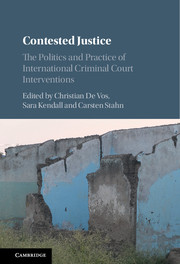
-
Select format
-
- Publisher:
- Cambridge University Press
- Publication date:
- 14 December 2015
- 18 December 2015
- ISBN:
- 9781139924528
- 9781107076532
- Creative Commons:
-
This content is Open Access and distributed under the terms of the Creative Commons Attribution licence CC-BY-NC 4.0.
https://creativecommons.org/creativelicenses - Dimensions:
- (228 x 152 mm)
- Weight & Pages:
- 0.87kg, 526 Pages
- Dimensions:
- Weight & Pages:
- Subjects:
- Public International Law, Law, Criminal Law
Open AccessYou have digital access to this book- Subjects:
- Public International Law, Law, Criminal Law
Book description
The International Criminal Court emerged in the early twenty-first century as an ambitious and permanent institution with a mandate to address mass atrocity crimes such as genocide and crimes against humanity. Although designed to exercise jurisdiction only in instances where states do not pursue these crimes themselves (and are unwilling or unable to do so), the Court's interventions, particularly in African states, have raised questions about the social value of its work and its political dimensions and effects. Bringing together scholars and practitioners who specialise on the ICC, this collection offers a diverse account of its interventions: from investigations to trials and from the Court's Hague-based centre to the networks of actors who sustain its activities. Exploring connections with transitional justice and international relations, and drawing upon critical insights from the interpretive social sciences, it offers a novel perspective on the ICC's work. This title is also available as Open Access.
Reviews
'The book is an invaluable text for civil society organisations, researchers and practitioners looking to understand ICC interventions and wider debates on the local and global justice dynamics. Notably the book is available online free as an open access book, enabling greater access.'
Luke Moffett Source: Criminal Law and Criminal Justice
Contents
Full book PDF-
18 - Between justice and politics
pp 456-478 - The ICC’s intervention in Libya
-
-
-
- You have access
- Open access
- HTML
- Export citation
-
-
19 - Peace making, justice and the ICC
pp 479-495 -
-
-
- You have access
- Open access
- HTML
- Export citation
-
-
Index
pp 496-504 -
-
- You have access
- Open access
- HTML
- Export citation
-
Metrics
Altmetric attention score
Full text views
Full text views help Loading metrics...
Loading metrics...
* Views captured on Cambridge Core between #date#. This data will be updated every 24 hours.
Usage data cannot currently be displayed.
Accessibility standard: Unknown
Why this information is here
This section outlines the accessibility features of this content - including support for screen readers, full keyboard navigation and high-contrast display options. This may not be relevant for you.
Accessibility Information
Accessibility compliance for the PDF of this book is currently unknown and may be updated in the future.


